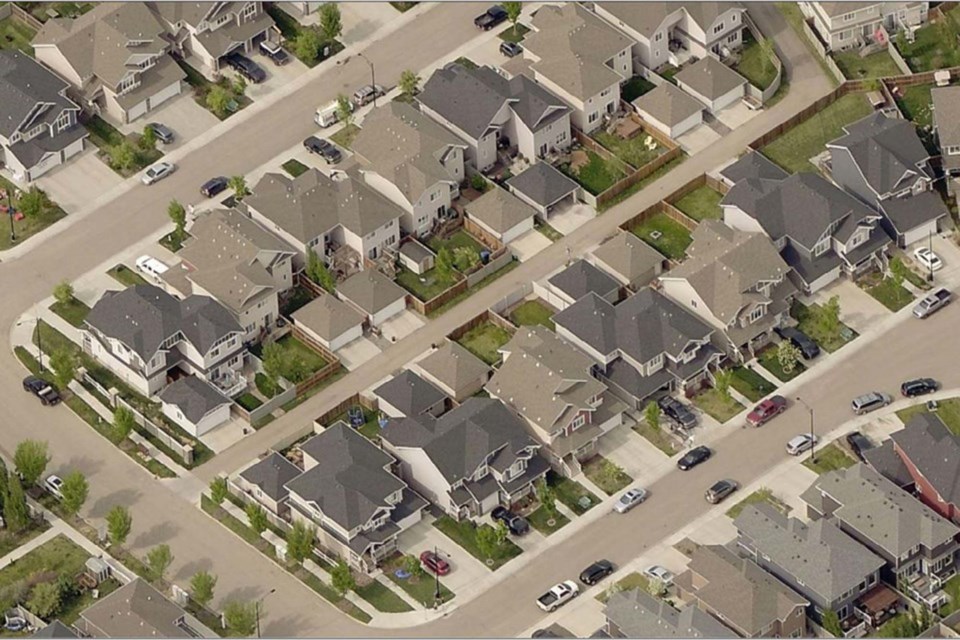The St. Albert Gazette will continue to dig into municipal funding challenges facing communities across North America in a series called Bridging the Municipal Funding Gap. This story is part of the series to help provide context to the struggle happening in St. Albert. The sixth story in the series will be released next week
Municipal planning experts often consider the way cities and communities are built and financed as Ponzi schemes.
The property taxes and municipal revenues recouped from a house, street, or cul-de-sac are not enough to fund the maintenance, repair, and replacement needs for the roads and service delivery in the area.
Daniel Herriges, a senior editor for Strong Towns, a non-profit group that advocates for more sustainable development, said it can take decades for one cul-de-sac to pay for the repaving of the road in front of the houses in it.
“In the case study that we did, it was going to take 79 years for the residents of a particular cul-de-sac to generate enough public revenue to maintain their own cul-de-sac, and that isn't going to last even a fraction [of] 79 years,” Herriges said.
Instead of relying on the current residents to pay for the repaving, a city will grow and build new neighbourhoods and the tax revenue from those new residents will pay for the repaving in the older communities. The new residents and new streets won’t need any repair, maintainenance, or replacement work for years, and their current property taxes will go to support the older neighbourhoods.
But as the new communities start to age and require their own repair work, money often hasn't been set aside to support the work. Instead, new growth funds the old infrastructure repairs.
Herriges said the Ponzi-scheme structure is unintentional, and not nefarious on the part of municipal governments, planners, and leaders, who are not committing any kind of criminal conspiracy.
“It's a Ponzi scheme in the sense that as long as you keep growing, as long as you keep building, bringing in new residents, bringing in new sources of revenue, a new tax base, you can keep up with the maintenance,” Herriges said.
But when that stops, for whatever reason, you get overwhelmed by the backlog of maintenance needs.
In the long run, municipalities need to ask themselves when they make a public investment or build a piece of public infrastructure, if they can find a source of revenue for that project to maintain it or replace it when the time comes.
Herriges said the way North American communities started developing after the post-Second World War era was to accommodate cars with big wide roads, rather than to the scale of a community full of people walking. To support cars, a massive amount of money was spent on building public infrastructure for cars, including tons of parking lots, with no calculations or math on how to maintain this, because there was an assumption future growth would fund the maintenance.
The spread-out structure means more public infrastructure to connect the community, including increasing the kilometres of roads, sewer, water, and even more fire hydrants, which will require more funding per capita to repair.
And while cities across North America are now falling short on funds to repair, maintain, and replace their infrastructure, it is difficult to get grant funding for replacing old projects and much easier to get the funds to build a new road.
“It's hard to get through money to replace it because most of the available grant money is for new projects. That's where all the political incentives lie. You want something new you can have a ribbon cutting for,” Herriges said.
Right now St. Albert, like many communities, is facing a repair, maintain, and replace deficit. The city is considering forming a municipal energy corporation as an alternative source of revenue to stave off a 1.5-per-cent property-tax increase to make up for the current $16-million annual cash shortfall to repair, maintain, and replace the existing infrastructure in the city.
Municipalities are responsible for 60 per cent of the infrastructure in Canada, but collect fewer tax dollars than other orders of government, leaving them in a position to rely heavily on support and grant funding from their provincial and federal counterparts.
Rural communities are struggling more than their urban counterparts, Herriges said, because they have a stagnating or shrinking population base, so growth cannot fund their maintenance.
Rural Municipalities president Paul McLauchlin said it is a slippery slope to rely on grant-based funding for capital projects, such as building a community centre, bridge, or library, because the moment you complete the construction of the project, communities must immediately start saving to replace that infrastructure.
Some communities could save for 40 years and never come up with the funds to replace the aging infrastructure, because they didn’t have the tax base to come up with the money to build the project in the first place, which leaves them relying on unpredictable grant funding to repair, maintain, and replace it.
“You're basically on a treadmill, and it's very difficult to get off that treadmill,” McLauchlin said.
“You get into a really tough position in that perspective because you'll never be able to build that reserve for capital replacement fast enough with other fiscal constraints that you're having as a municipality.”
Read more from StAlbertToday.ca



